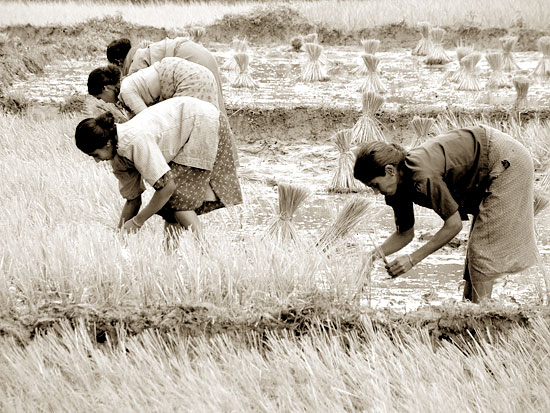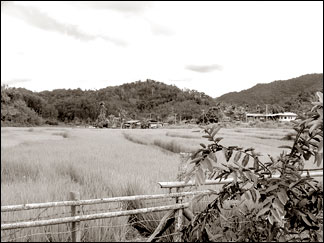World food crisis turns rice into gold
By Richard Lloyd Parry
Until a few months ago, Booncherd Leekasem would never have been
caught astride a muddy tractor or squelching through buffalo dung in a
rice paddy.
 As a headman of Khao Ngam in central Thailand he had far more
respectable things to attend to, such as organising village affairs and
running the restaurant where his wife serves her famous crispy catfish
salad. As a headman of Khao Ngam in central Thailand he had far more
respectable things to attend to, such as organising village affairs and
running the restaurant where his wife serves her famous crispy catfish
salad.
Mr. Booncherd rented his 14 hectares (35 acres) of land to poor
relatives and let them endure the backbreaking labour of planting,
weeding and harvesting the rice. This year all that has changed and now
Mr Booncherd gladly spends his days in the fields beneath the tropical
sun.
“In the past, when kids in school were asked what their father did,
they would be ashamed to say, ‘He is a farmer’,” he says. “But now being
a farmer is nothing to be ashamed of - we can be proud of what we do.”
All over the country, Thais are returning to the paddies like
prospectors chasing gold. After a global surge in the price of grain, a
gruelling, unglamorous occupation has become highly lucrative.
The economic opportunities have also brought risks as farmers get
deeper into debt, fight over scarce water resources and are forced to
defend their fields from a new breed of rice bandit.
Thailand’s 20 million farmers find themselves at the centre of an
unprecedented surge in global food prices - a “silent tsunami”, in the
words of the UN World Food Programme - that is threatening starvation
for millions.
Its causes are multiple. A newly affluent middle class in countries
such as China and India is increasing demand for food at a time when
more and more crops are being diverted toenvironmentally friendly
biofuels.
A series of natural disasters, from droughts in Australia to floods
in North Korea and cyclones in Bangladesh, have ruined harvests and
further reduced food stocks.
As prices have risen, there have been riots and protests in 33
countries, from Haiti to the Philippines. To keep rice affordable in
local markets, big producers such as Vietnam and India have restricted
exports - further driving up the international price. In Thailand, the
world’s biggest exporter, the result has been a rice bonanza.
 A year ago, a tonne of Thai Grade B rice sold for $325 (£164); last
week, the rate was $960 and climbing. Rice farming has become three
times more lucrative, and rice farmers are galloping to cash in. A year ago, a tonne of Thai Grade B rice sold for $325 (£164); last
week, the rate was $960 and climbing. Rice farming has become three
times more lucrative, and rice farmers are galloping to cash in.
Fields that have lain fallow are being ploughed and planted; in wet
and fertile central Thailand, where Mr. Booncherd lives, farmers are
contemplating three or even four harvests a year, beyond the usual one
or two.
The boom is not bringing uncomplicated happiness, however. Mr.
Booncherd has been engaged in a bitter dispute with neighbours about
access to water, solved only after investing in expensive new pumps to
draw in supplies from a distant canal.
If rice is now more expensive, so are the fertiliser and insecticide
that farmers use to nurture and protect it and the fuel for tractors and
harvesting machines. In any case, the grain passes through the hands of
several middlemen - traders, millers and exporters - who all take their
cut before it is sold at the international market price.
And the preciousness of the commodity has created fears of rice
bandits marauding the fields by night. Daourieng Kitsamit, a farmer in
Ayutthaya province, had 63 buckets of seed rice stolen from his fields.
Thai police are laying on night-time patrols and farmers have formed
village militias.
As long as the price is going up, these risks will be handsomely
outweighed by profits, but if Thailand were to resort to its own export
restrictions, local prices would fall, burdening farmers with debt. If
that happens, Mr. Booncherd will be glad of his restaurant and his
wife’s spicy catfish.
Courtesy: Timesonline
|
